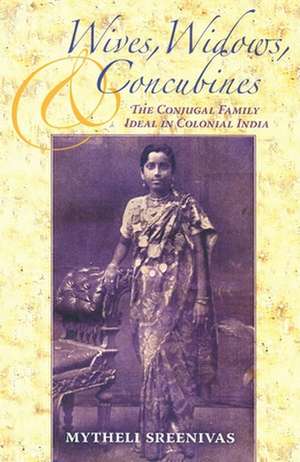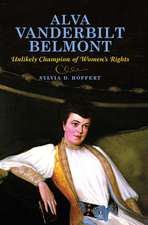Wives, Widows, and Concubines – The Conjugal Family Ideal in Colonial India
Autor Mytheli Sreenivasen Limba Engleză Paperback – 12 iun 2008
Preț: 176.22 lei
Nou
Puncte Express: 264
Preț estimativ în valută:
33.72€ • 36.06$ • 28.11£
33.72€ • 36.06$ • 28.11£
Carte tipărită la comandă
Livrare economică 18 aprilie-02 mai
Preluare comenzi: 021 569.72.76
Specificații
ISBN-13: 9780253219725
ISBN-10: 0253219728
Pagini: 192
Dimensiuni: 155 x 233 x 13 mm
Greutate: 0.34 kg
Editura: MH – Indiana University Press
ISBN-10: 0253219728
Pagini: 192
Dimensiuni: 155 x 233 x 13 mm
Greutate: 0.34 kg
Editura: MH – Indiana University Press
Cuprins
Contents
Acknowledgments
Note on Transliteration
Introduction: Situating Families
1. Colonizing the Family: Kinship, Household, and State
2. Conjugality and Capital: Defining Women's Rights to Family Property
3. Nationalizing Marriage: Indian and Dravidian Politics of Conjugality
4. Marrying for Love: Emotion and Desire in Women's Print Culture
Conclusion: Families and History
Notes
Bibliography
Index
Recenzii
Colonial voices from Wives, Widows, and Concubines: "The Zemindar used to take his meals with me. The Zemindar used to sleep during nights in the upstairs of the new palace. I and he used to sleep in the same bed." Menakshi Sundra Nachiar, 1893 "Whenever my husband felt amorous, he would occasionally cohabit with any woman and pay her occasionally. This is all. They were concubines." Muthuverammal, 1885 "The very principle of the joint family is against giving equal rights to females." P. C. Tyagaraja Iyer, 1935
"Sreenivass discussion points to the importance for feminist scholarship of exploring the links among conjugality, kinship, and capitalisms both historically and today." Feminist Formations, Fall 2012
Colonial voices from Wives, Widows, and Concubines: "The Zemindar used to take his meals with me. The Zemindar used to sleep during nights in the upstairs of the new palace. I and he used to sleep in the same bed." Menakshi Sundra Nachiar, 1893 "Whenever my husband felt amorous, he would occasionally cohabit with any woman and pay her occasionally. This is all. They were concubines." Muthuverammal, 1885 "The very principle of the joint family is against giving equal rights to females." P. C. Tyagaraja Iyer, 1935 "Sreenivas's discussion points to the importance for feminist scholarship of exploring the links among conjugality, kinship, and capitalisms both historically and today." Feminist Formations, Fall 2012
"Sreenivass discussion points to the importance for feminist scholarship of exploring the links among conjugality, kinship, and capitalisms both historically and today." Feminist Formations, Fall 2012
Colonial voices from Wives, Widows, and Concubines: "The Zemindar used to take his meals with me. The Zemindar used to sleep during nights in the upstairs of the new palace. I and he used to sleep in the same bed." Menakshi Sundra Nachiar, 1893 "Whenever my husband felt amorous, he would occasionally cohabit with any woman and pay her occasionally. This is all. They were concubines." Muthuverammal, 1885 "The very principle of the joint family is against giving equal rights to females." P. C. Tyagaraja Iyer, 1935 "Sreenivas's discussion points to the importance for feminist scholarship of exploring the links among conjugality, kinship, and capitalisms both historically and today." Feminist Formations, Fall 2012
Notă biografică
Mytheli Sreenivas is Assistant Professor of History and Women's Studies at The Ohio State University.
Descriere
Debates about family, property, and nation in Tamil India

















